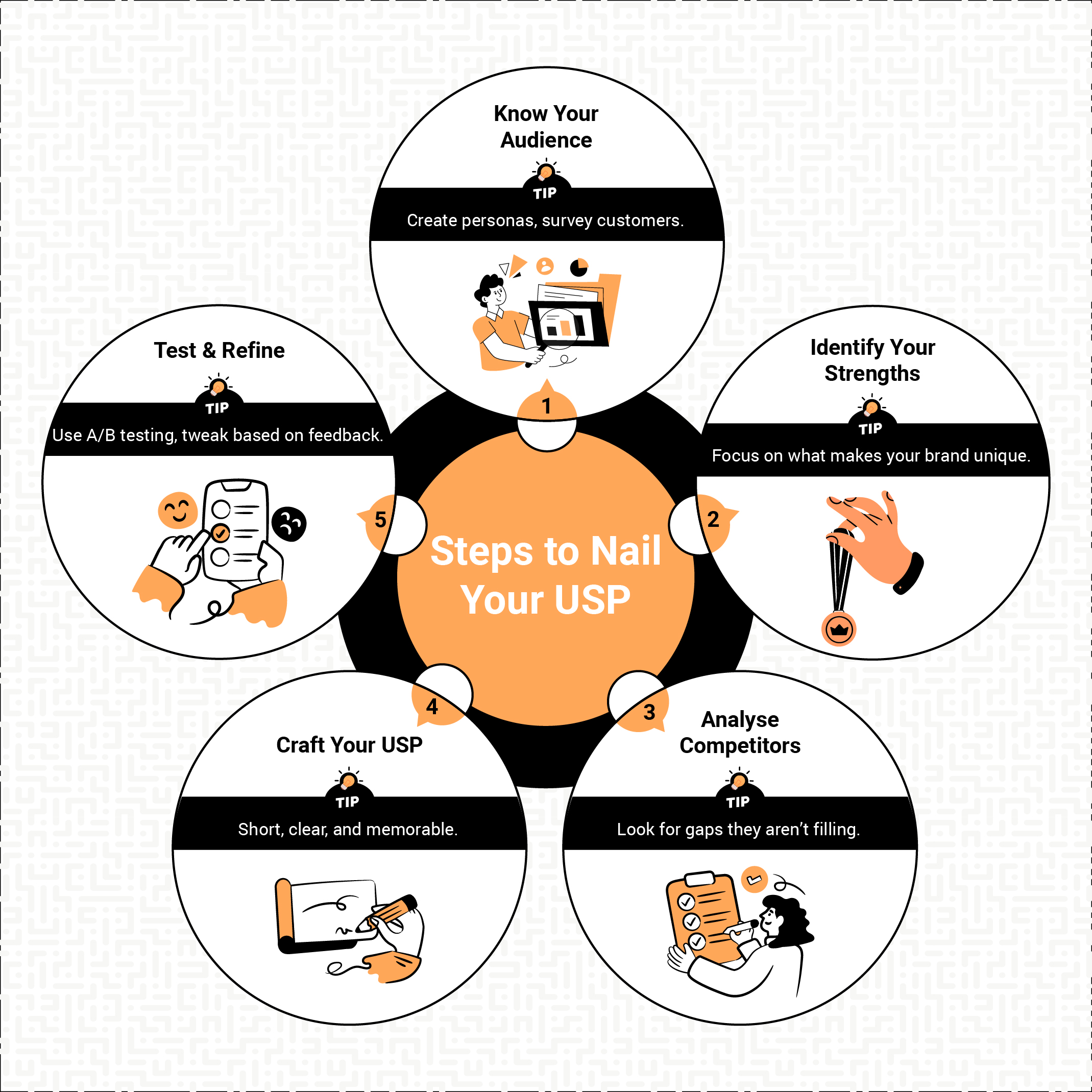Have you ever found yourself scratching your head, wondering why some brands have customers flocking to them like seagulls to a chip while others are left waving their arms in the wind? What secret sauce makes one business shine like a diamond and another fade into the background? It’s all about your Unique Selling Proposition (USP).
In a world where everything starts to look the same, how do you ensure your brand is the one that gets all the attention? Ready to dive into the fun and slightly rebellious art of nailing your USP? Let’s see how daring to be different can give your brand the spotlight it deserves!
What is a USP (Unique Selling Proposition)?
A Unique Selling Proposition (USP) is the distinctive factor that sets your product or service apart from competitors. It answers the question: “Why should customers choose you over others?”
Simple Examples of USPs
-
Domino’s Pizza: “You get fresh, hot pizza delivered to your door in 30 minutes or less — or it’s free.”
-
TOMS Shoes: “With every pair you purchase, TOMS will give a pair of new shoes to a child in need.”
These examples show clear, specific benefits that make the brand memorable and competitive.
USP vs. Value Proposition vs. Tagline
| Concept | Definition | Example |
|---|---|---|
| USP | A specific feature or benefit that makes your offering unique. | Domino’s 30-minute delivery guarantee |
| Value Proposition | A broader statement describing the overall value your product delivers. | “Affordable, convenient, quality pizza delivered fast.” |
| Tagline | A short, catchy phrase used in marketing. | “Just Do It” (Nike) |
Understanding the importance of a Unique Selling Proposition (USP)
Imagine walking down a supermarket aisle. You see rows and rows of products that look almost identical. What makes you reach for one over the others? That’s the magic of a well-crafted USP. Your USP isn’t just a catchy slogan; it’s the core of your brand’s identity. Here's why a strong USP matters:
1.Helps Cut Through the Noise
A clear USP makes your brand stand out in a sea of competitors. It grabs attention and communicates quickly why you’re the better choice.
2. Builds Stronger Customer Loyalty
When customers connect with your USP, they are more likely to remember your brand and return for repeat purchases — fostering loyalty beyond just price.
3. Reduces Reliance on Discounts/Price Wars
A unique proposition shifts the focus from competing on price to competing on value, meaning you don't have to rely on endless discounts to attract customers.
It’s the reason your customers choose you, stick with you, and tell their friends about you. Without a clear USP, your brand risks becoming just another option — one that’s easily overlooked.
Identifying what sets you apart: A deep dive into self-analysis
Before you can tell the world what makes you different, you must know it yourself. This means taking a good, hard look at what you offer. Ask yourself: What can we do that no one else can? It might be a unique feature, an innovative service, or how you make your customers feel. Whatever it is, it has to be something your competitors can’t easily copy.
Start by listing out your strengths. Look at your product or service through the eyes of your customers. What problems do you solve for them? How do you make their lives better? This isn’t about being better than your competitors; it’s about being different in a way that truly matters to your customers.

Analysing competitors: Finding gaps in a saturated market
Knowing what makes you unique is just one side of the coin. You also need to understand what your competitors are up to. This doesn’t mean copying what they’re doing — it means understanding where they fall short so you can fill the gaps.
Take a close look at your competitors. What do they promise? More importantly, what do they fail to deliver? Look for the gaps in the market, the unmet needs, and the unfulfilled desires. These are your opportunities to shine. If everyone else is focused on speed, you could focus on quality. If they’re all about high-end luxury, perhaps you offer something more approachable and down-to-earth.
Crafting a compelling USP: Key elements to consider
Now that you’ve got a handle on what makes you unique and where your competitors are lacking, it’s time to craft your USP. But remember, a great USP is more than just a clever tagline. It’s a promise to your customers that needs to be clear, compelling, and impossible to ignore. Your USP should be:
Clear
Avoid jargon and buzzwords. Your USP should be easily understood by anyone, from your grandma to your future customers comprising Gen Z and Alpha.
Specific
Vague promises don’t cut it. Get specific about what makes you different and why that difference matters.
Customer-Centric
Your USP isn’t about you; it’s about your customers. Focus on the value you bring to them, not just what you do.
Real-world examples: Brands that mastered the art of differentiation
Sometimes, the best way to understand a concept is through examples. Let’s look at some brands that have nailed their USPs and turned them into powerful growth engines.
Apple
Apple doesn’t just sell tech; it sells an experience. Its USP is about design, innovation, and a seamless user experience. Apple products aren’t just tools — they’re lifestyle choices.
Amul
Amul stands out for its commitment to high-quality, affordable dairy products. Its USP? Wholesome dairy with a touch of nostalgia, reinforced by iconic, witty ad campaigns.
How to communicate your USP effectively across channels
So, once you’ve nailed down your USP. Now, how do you make sure the world knows about it? Your USP should be the backbone of all your communications, from your website to your social media and packaging.
Start by weaving your USP into your brand story. Every content you create must reinforce what makes you unique. Consistency is key — your USP should be the same whether someone is reading your blog, watching your ads, or chatting with your customer service team.
Avoiding the pitfalls: Common mistakes when defining a USP
Crafting a USP isn’t easy, and it’s easy to fall into common traps. Here are a few mistakes to avoid —
Being too generic
A USP that could apply to any business is one that will be ignored. Make sure yours is truly unique to your brand. Statements like “We provide quality service” or “Best in the business” are overused and don’t differentiate you. Your USP needs specificity.
Overpromising
Don’t promise what you can’t deliver. Your USP must be realistic and achievable, or you’ll lose credibility.
Focusing only on the price
Competing on price only is a race to the bottom. Your USP should be about your value, not just the cost.
Focusing Only on Features, Not Benefits
Customers care about how a product benefits them, not just its features. Frame your USP around the problem you solve.
Inconsistency Across Touchpoints
If your website, ads, and social media don’t consistently communicate your USP, customers will get confused. Consistency builds trust and brand recognition.
Evolving with the market: Keeping your USP relevant
The market is constantly evolving, and so are your customers’ needs. That’s why your USP can’t be static. It needs to evolve as your brand grows and the market shifts. Keep an eye on trends, listen to your target customers, and be ready to adapt your USP to stay relevant.
Conclusion: Leveraging your USP for long-term brand loyalty
A strong USP doesn’t just attract customers — it keeps them coming back. When your USP is clear, compelling, and consistently delivered, it builds trust and loyalty. Customers know what to expect from your brand and choose you repeatedly.
Your USP is more than only a marketing tool. It's the foundation of your brand identity and the key to long-term success. So, dare to be different. In a copycat world, standing out isn’t just an option — it’s a necessity.















